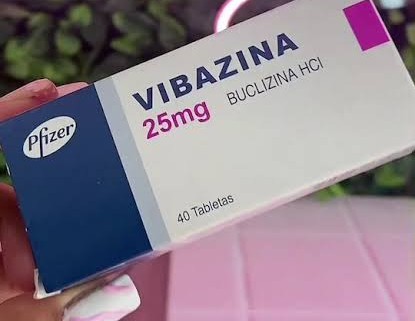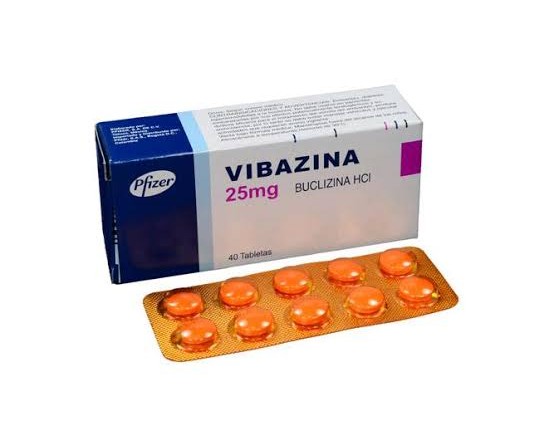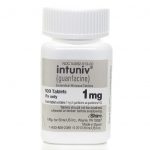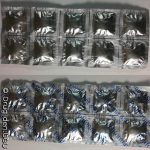Vibazina 25 mg: Uses, How it works, Benefits, Dosage, Side Effects, Interactions

What is Vibazina?
Vibazina is a Mexican brand of buclizine hydrochloride produced by Pfizer. Vibazina is an appetite stimulant used to treat loss of appetite in people and is generally prescribed by doctors. Vibazina is also prescribed to manage allergy problems, motion sickness, migraine, and in many cases, it is said that it also works to control anxiety.
Recently, Vibazina has gained popularity because of its use as a weight gain medication by persons who are underweight or patients whose body weight is considered too low to be healthy. Appetite stimulant drugs are intended to increase appetite and promote weight gain in people who are unable to eat enough calories to maintain a healthy weight.
Each tablet of Vibazina contains 25 mg of buclizine hydrochloride as the active ingredient.
How it works
Vibazina is an antihistamine medication with both antiemetic and anticholinergic effects, belonging to the piperazine derivative family of drugs. The exact mechanism of Vibazina’s appetite-stimulating action is not known. But researchers believe the medication work by influencing certain chemical messengers and activating receptors throughout the body that increase hunger as well as promote appetite.

How should I take Vibazin?
The recommended dose of Vibazina in adults is 25-50 mg as a single dose; your doctor may recommend further doses as needed. The maximum recommended dose is 100 mg daily. Dosage recommendations may vary among countries and individual products (refer to detailed product guidelines).
The recommended dose of Vibazina to prevent motion sickness is 50mg (2 tablets) given at least 30 min before traveling which may be repeated, if necessary, after 4–6 hours. The usual dose to alleviate nausea is 50 mg (2 tablets) given up to three times daily.
In the treatment of migraine, Vibazina is given in usual doses of 12.5 mg at the start of an attack or when one is known to be imminent. In pruritic skin disorders, the usual dose of Vibazina is 25–50 mg (1-2 tablets) daily.
Follow the directions on your prescription label carefully, and ask your doctor or pharmacist to explain any part you do not understand. Take Vibazina exactly as directed. Do not take more or less of it or take it more often than prescribed by your doctor.
What happens if I miss a dose of Vibazina?
Since Vibazina is taken when needed, you may not be on a dosing schedule. If you are taking the medication regularly, take the missed dose as soon as you remember. Skip the missed dose if it is almost time for your next scheduled dose. Do not take extra medicine to make up for the missed dose.
What happens if I overdose on Vibazina?
If you or someone accidentally took more than the recommended dose of Vibazina, seek emergency medical attention or call the Poison Help line at 1-800-222-1222.
Vibazina overdose symptoms may include severe forms of some of the side effects listed in this medication guide.
What are the side effects of Vibazina?
Vibazina may cause side effects. Tell your doctor if any of these symptoms are severe or do not go away:
- Drowsiness
- Dizziness
- Incoordination
- Headache
- Nausea
- Vomiting
- Stomach pain
- Diarrhea
- Blurred vision
- Urinary retention
- Dry mouth
- Rash
- Weight gain
If you experience a serious side effect, you or your doctor may send a report to the Food and Drug Administration’s (FDA) MedWatch Adverse Event Reporting program online (http://www.fda.gov/Safety/MedWatch) or by phone (1-800-332-1088).
What medications can interact with Vibazina?
Avoid taking Vibazina the following medications:
- CNS depressants (medicines that make you drowsy or less alert). Some examples of CNS depressants are antihistamines
- Medicine for hay fever, other allergies, or colds; sedatives, tranquilizers, or sleeping medicine
- Prescription pain medicine or narcotics; barbiturates
- Medicine for seizures; muscle relaxants
- Anesthetics, including some dental anesthetics.
Check with your doctor before taking any of the above while you are using this medicine. Also, tell the doctor in charge that you are taking this medicine before you have any skin tests for allergies. The results of the test may be affected by Vibazin.
Can I take alcohol while taking Vibazina?
No, avoid alcohol and products containing alcohol while taking this medication because it can enhance the effects of alcohol and increase the risk of unwanted side effects.
This medicine may cause some people to become drowsy or less alert than they are normally Make sure you know how you react to this medicine before you drive, use machines, or do anything else that could be dangerous if you are not alert.





